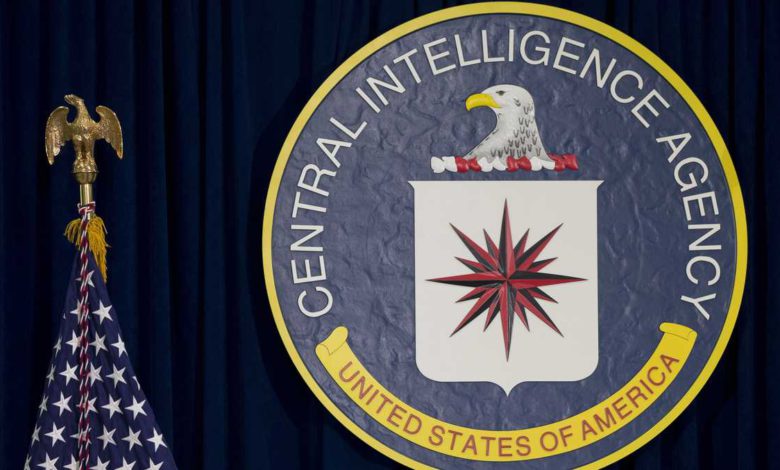

The CIA has a secret, undisclosed data repository that includes information collected about Americans, two Democrats on the Senate Intelligence Committee said Thursday. While neither the agency nor lawmakers would disclose specifics about the data, the senators alleged the CIA had long hidden details about the program from the public and Congress. Sens. Ron Wyden of Oregon and Martin Heinrich of New Mexico sent a letter to top intelligence officials calling for details about the program to be declassified. Large parts of the letter and documents released by the CIA were blacked out. Wyden and Heinrich said the program operated "outside the statutory framework that Congress and the public believe govern this collection." There have long been concerns about what information the intelligence community collects about Americans. The CIA and National Security Agency have a foreign mission and are generally barred from investigating Americans or U.S. businesses. But the spy agencies' sprawling collection of foreign communications often snares Americans' messages and data incidentally. Intelligence agencies are required to take steps to protect U.S. information, including redacting the names of any Americans from reports unless they are deemed relevant to an investigation. The process of removing redactions is known as "unmasking." The agencies are also subject to guidelines on the handling and destruction of Americans' data. "CIA recognizes and takes very seriously our obligation to respect the privacy and civil liberties of U.S. persons in the conduct of our vital national security mission," Kristi Scott, the agency's privacy and civil liberties officer, said in a statement. "CIA is committed to transparency consistent with our obligation to protect intelligence sources and methods."The CIA released a series of redacted recommendations about the program issued by an oversight panel known as the Privacy and Civil Liberties Oversight Board. According to the document, a pop-up box warns CIA analysts using the program that seeking any information about U.S. citizens or others covered by privacy laws requires a foreign intelligence purpose. "However, analysts are not required to memorialize the justification for their queries," the board said. Both senators have long pushed for more transparency from the intelligence agencies. Nearly a decade ago, a question Wyden posed to the nation's spy chief presaged critical revelations about the NSA's mass-surveillance programs. In 2013, Wyden asked then-Director of National Intelligence James Clapper if the NSA collected "any type of data at all on millions or hundreds of millions of Americans." Clapper responded, "No."Former systems administrator Edward Snowden later that year revealed the NSA's access to bulk data through U.S. internet companies and hundreds of millions of call records from telecommunications providers. Those revelations sparked worldwide controversy and new legislation in Congress. Clapper would later apologize in a letter to the Senate Intelligence Committee. According to Wyden and Heinrich's letter, the CIA's bulk collection program operates outside of laws passed and reformed by Congress, but under the authority of Executive Order 12333, the document that broadly governs intelligence community activity and was first signed by President Ronald Reagan in 1981."It is critical that Congress not legislate without awareness of a ... CIA program, and that the American public not be misled into believe that the reforms in any reauthorization legislation fully cover the IC's collection of their records," the senators wrote in their letter. There was a redaction in the letter before "CIA program."Documents released by the CIA Thursday also revealed limited details about a program to collect financial data against the Islamic State. That program also has incidentally snared some records held by Americans. The intelligence community has faced years of political turmoil and attacks by former President Donald Trump over the investigation into Trump campaign ties to Russia. Special counsel Robert Mueller would bring charges against 34 people, including the former president's one-time campaign chairman, Paul Manafort, and 25 Russians on charges linked to alleged election interference. But a probe of the origins of the Russia investigation also found broad problems with the FBI's surveillance applications against a Trump campaign adviser, Carter Page.
The CIA has a secret, undisclosed data repository that includes information collected about Americans, two Democrats on the Senate Intelligence Committee said Thursday. While neither the agency nor lawmakers would disclose specifics about the data, the senators alleged the CIA had long hidden details about the program from the public and Congress.
Sens. Ron Wyden of Oregon and Martin Heinrich of New Mexico sent a letter to top intelligence officials calling for details about the program to be declassified. Large parts of the letter and documents released by the CIA were blacked out. Wyden and Heinrich said the program operated "outside the statutory framework that Congress and the public believe govern this collection."
There have long been concerns about what information the intelligence community collects about Americans. The CIA and National Security Agency have a foreign mission and are generally barred from investigating Americans or U.S. businesses. But the spy agencies' sprawling collection of foreign communications often snares Americans' messages and data incidentally.
Intelligence agencies are required to take steps to protect U.S. information, including redacting the names of any Americans from reports unless they are deemed relevant to an investigation. The process of removing redactions is known as "unmasking." The agencies are also subject to guidelines on the handling and destruction of Americans' data.
"CIA recognizes and takes very seriously our obligation to respect the privacy and civil liberties of U.S. persons in the conduct of our vital national security mission," Kristi Scott, the agency's privacy and civil liberties officer, said in a statement. "CIA is committed to transparency consistent with our obligation to protect intelligence sources and methods."
The CIA released a series of redacted recommendations about the program issued by an oversight panel known as the Privacy and Civil Liberties Oversight Board. According to the document, a pop-up box warns CIA analysts using the program that seeking any information about U.S. citizens or others covered by privacy laws requires a foreign intelligence purpose.
"However, analysts are not required to memorialize the justification for their queries," the board said.
Both senators have long pushed for more transparency from the intelligence agencies. Nearly a decade ago, a question Wyden posed to the nation's spy chief presaged critical revelations about the NSA's mass-surveillance programs.
In 2013, Wyden asked then-Director of National Intelligence James Clapper if the NSA collected "any type of data at all on millions or hundreds of millions of Americans." Clapper responded, "No."
Former systems administrator Edward Snowden later that year revealed the NSA's access to bulk data through U.S. internet companies and hundreds of millions of call records from telecommunications providers. Those revelations sparked worldwide controversy and new legislation in Congress.
Clapper would later apologize in a letter to the Senate Intelligence Committee.
According to Wyden and Heinrich's letter, the CIA's bulk collection program operates outside of laws passed and reformed by Congress, but under the authority of Executive Order 12333, the document that broadly governs intelligence community activity and was first signed by President Ronald Reagan in 1981.
"It is critical that Congress not legislate without awareness of a ... CIA program, and that the American public not be misled into believe that the reforms in any reauthorization legislation fully cover the IC's collection of their records," the senators wrote in their letter. There was a redaction in the letter before "CIA program."
Documents released by the CIA Thursday also revealed limited details about a program to collect financial data against the Islamic State. That program also has incidentally snared some records held by Americans.
The intelligence community has faced years of political turmoil and attacks by former President Donald Trump over the investigation into Trump campaign ties to Russia. Special counsel Robert Mueller would bring charges against 34 people, including the former president's one-time campaign chairman, Paul Manafort, and 25 Russians on charges linked to alleged election interference. But a probe of the origins of the Russia investigation also found broad problems with the FBI's surveillance applications against a Trump campaign adviser, Carter Page.
Source link







